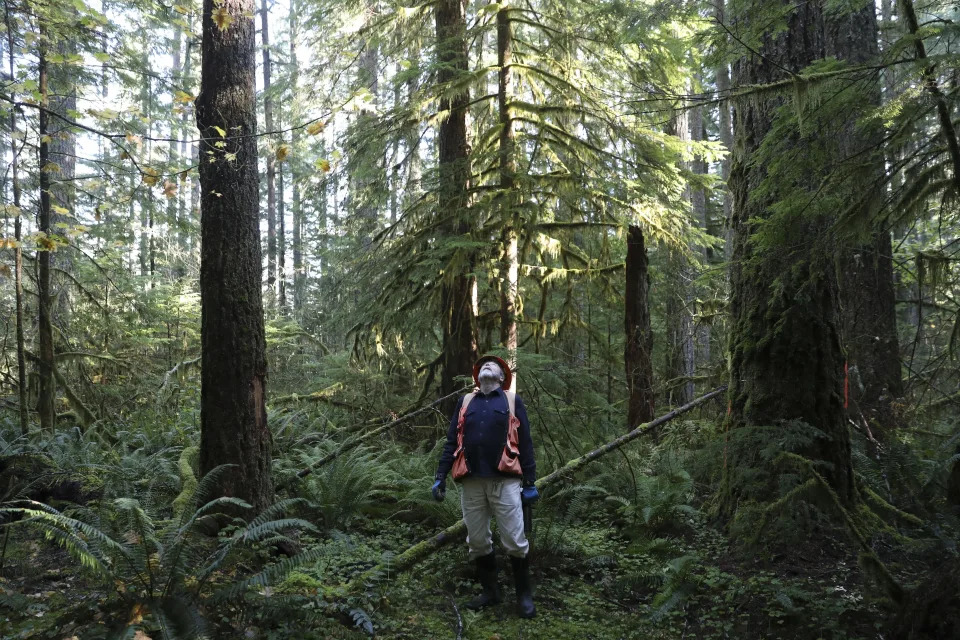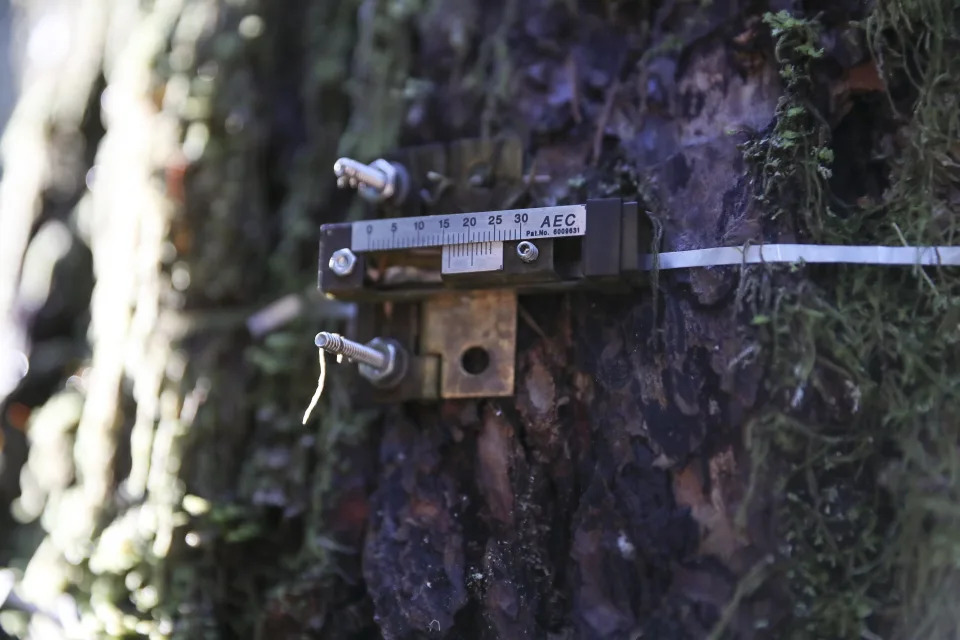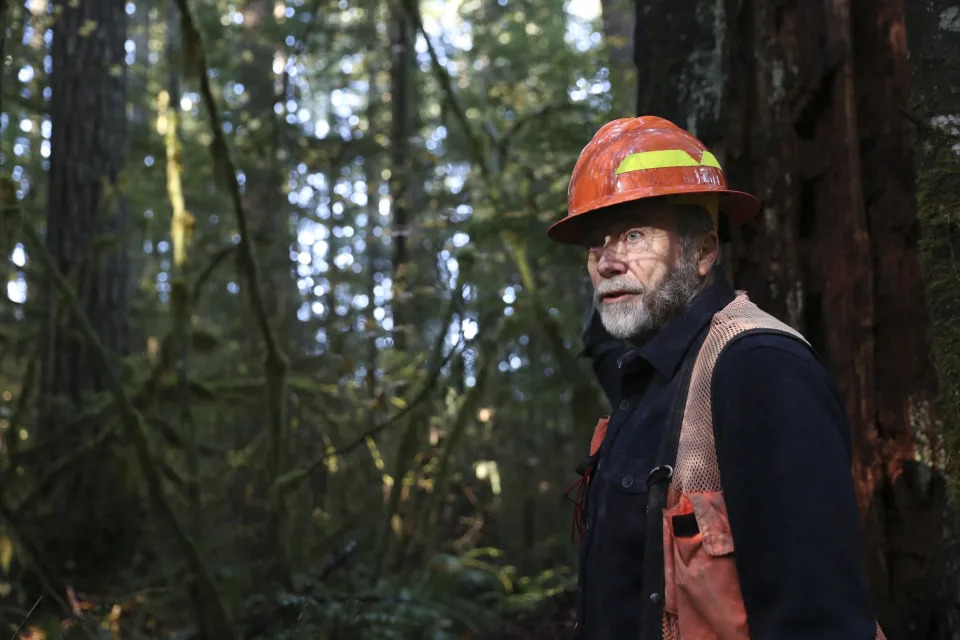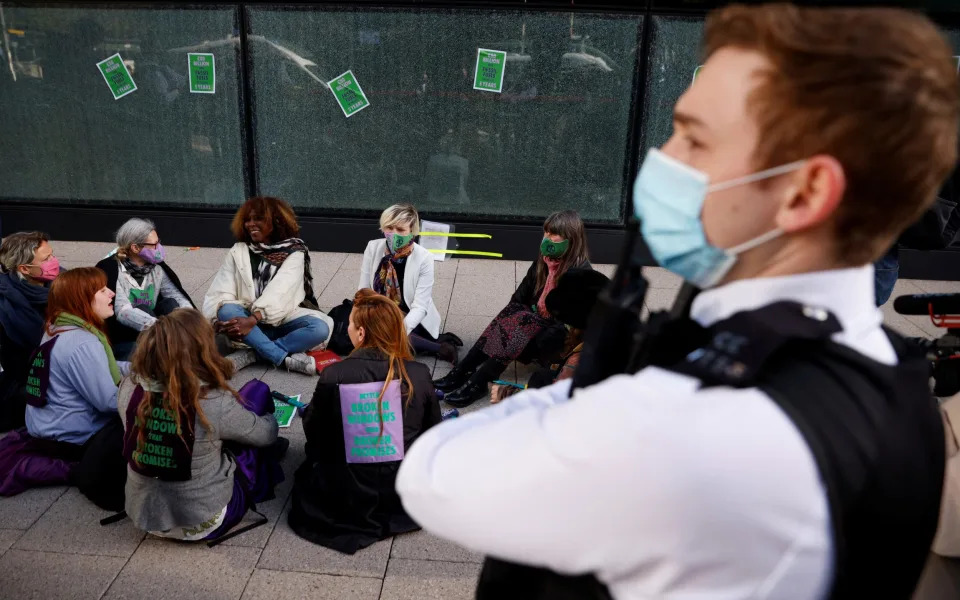A Republican proposal to legalize medical marijuana in Wisconsin is coming soon
SCOTT BAUER
Updated Thu, December 21, 2023

Wisconsin Assembly Speaker Robin Vos speaks during an interview with The Associated Press at the state Capitol in Madison, Wis., on Wednesday, Dec. 20, 2023. Vos said Republicans plan to introduce a bill in January to legalize medical marijuana in the state. (AP Photo/Harm Venhuizen)
MADISON, Wis. (AP) — Wisconsin Republicans plan to unveil a proposal soon to legalize medical marijuana in the state and could vote on it sometime in 2024, Assembly Speaker Robin Vos said.
Republicans have been working behind closed doors for years on a medical marijuana bill. Along the way, they have rejected calls from Gov. Tony Evers and other Democrats to legalize all uses of marijuana, including medical and recreational.
Vos, in an interview Wednesday, said the proposal will be limited and modeled after the medical marijuana law that had been in place in neighboring Minnesota before it moved to full legalization.
“It is not going to be widespread,” he said. “We are not going to have dispensaries on every corner in every city.”
He said Assembly Republicans are on board in concept, but no one has seen the actual proposal yet. He expected to unveil it in January. Vos had said in April that he hoped to have the bill by the fall of 2023, but he said it took more time to find consensus.
“In concept most people are there, but I don’t want to guarantee anything until we have a wider discussion,” he said. “I feel pretty good that we’re in a place where I think it can get through our chamber."
Democratic state Sen. Melissa Agard, who has advocated for full marijuana legalization, said Thursday that she could support a more limited medical marijuana program, but “I remain skeptical as to whether or not this is it.” Agard, who has traveled the state calling for legalization, said she has offered to work with Republicans on the bill but has been rejected.
If passed by both the Senate and Assembly, it would have to be signed by Evers before taking effect. His spokesperson did not return a message Thursday seeking comment.
Senate Republicans have been less open to pot legalization than those in the Assembly. But in January, Senate Majority Leader Devin LeMahieu said a bill to create a medical marijuana program could pass this legislative session — as long as regulations are put forward to ensure it’s for those in serious pain.
Vos has long backed some form of medical marijuana program, but no bill has ever received a vote in either the GOP-controlled Assembly or Senate.
Wisconsin remains an outlier nationally, with 38 states legalizing medical marijuana and 24 legalizing recreational marijuana. The push for legalization in Wisconsin has gained momentum, as its neighbors have loosened laws.
Marquette University Law School polls have shown large majority support among Wisconsin residents for legalizing marijuana use for years. Given that broad, bipartisan support, there should be full legalization, Agard said.
Medical marijuana bill coming back to Wisconsin in January. Here's what else is ahead on pot legalization in 2024.
Hope Karnopp, Milwaukee Journal Sentinel
Thu, December 21, 2023

At the start of this year, it seemed possible that Wisconsin's marijuana laws could change, and the state would join 38 others in offering a medical-use program.
That prospect came and went in 2023. But the momentum could pick up again in the new year.
In a year-end interview with the Milwaukee Journal Sentinel, Assembly Speaker Robin Vos said Republicans will reintroduce a medical marijuana bill in January. He said lawmakers have been meeting six or eight times for a couple hours, hammering out answers to about 50 questions.
"People have been frustrated because they think it took us too long," said Vos, a Republican from Rochester. "Well, because it took us a long time to reach consensus. Because part of the problem that I fear is that Democrats want everything or nothing."
Republican leaders have said they were close to legalizing medical marijuana before. Senate Majority Leader Devin LeMahieu said in January that his caucus was getting "pretty close" to supporting medical use. But unlike last year, that idea never got a public hearing.
LeMahieu, a Republican from Oostburg, told the Journal Sentinel earlier this month that the bill's author, Republican Sen. Mary Felzkowski of Tomahawk, had been meeting with Vos "to come to an agreement on what medical marijuana would look like."
Felzkowski didn't respond to requests for comment for this article. But LeMahieu sounded optimistic about the bill advancing next year.
"Depending on how that how that bill is drawn up, there's a potential of getting it through both houses, but I don't know," LeMahieu said. "I think they're just working through the details. So if they get on the same page, then potentially."
Beyond medical marijuana, what else happened in cannabis policy this year — and what could come next? We spoke to lawmakers at the forefront of the issue to look back and preview future developments:
One more of Wisconsin's neighbors legalizes recreational use of marijuana
Proponents of legalizing marijuana in Wisconsin have long called the state an "island of prohibition."
That became even more true this summer when Minnesota green-lit recreational cannabis use, joining neighbors Illinois and Michigan.
And nearby Ohio became the 24th state to legalize recreational marijuana, with the new law going into effect earlier this month. Ohio's citizen-driven referendum passed with 57% of voters supporting legalization.
More: Ohio voted to legalize marijuana and abortion. Could that happen in Wisconsin?
Recreational marijuana use remains illegal in Wisconsin. And although transporting marijuana across state lines is a federal crime, residents still do it.
In fact, a state estimate from March found Illinois collected $36.1 million in taxes from sales to Wisconsinites. Past estimates found legalizing weed in Wisconsin could generate $166 million in the first year.
And a majority of state residents want to see it happen. In the most recent Marquette Law School Poll, 64% supported legal marijuana. In 2019, the poll found 83% supported using marijuana for medical purposes.
Reintroduced bill reflects shifts toward decriminalizing marijuana
The latest cannabis bill in the Legislature, introduced by a Republican and two Democrats, wouldn't legalize marijuana but would reduce the fine to $100 for people possessing up to 14 grams.
Currently, marijuana possession is a misdemeanor and carries up to a $1,000 penalty and six months in jail. Convictions after that are raised to a felony, which can include up to $10,000 in fines and over 3½ years in jail.
Rep. Shae Sortwell, a Republican from Two Rivers, said the bill is a compromise to "try to bring together this wide range of disagreements related to marijuana policy."
More: Despite public support, marijuana is not legal yet in Wisconsin. Here's how some Milwaukee-area leaders feel about it.
The idea isn't new. A bipartisan group of lawmakers introduced a similar measure in 2017. And local governments in Wisconsin have already moved to lower penalties — including in Milwaukee County, where the fine was decreased to $1 in 2021.
In fact, the bill would raise penalties in municipalities like Green Bay, which has a $0 fine but $61 in court fees. It would require local governments to land between $100 and $250. Sortwell noted law enforcement can still charge higher — that can be the case for second offenses.
Sortwell said he didn't get "hard no's" on a hearing for the bill last time, but "they were kind of just waiting to kind of see what we were going to do in general." He hopes that, if the bill doesn't get a hearing this time, parts of it could be incorporated into the medical marijuana bill.
Vos said he doesn't support the decriminalization effort, believing it would be more difficult for Republicans to pass a medical marijuana bill if people are under the impression it would open the door to full marijuana legalization.
"I just think the problem in America is not too few people using drugs," Vos said, reiterating his opposition to legalizing marijuana for recreational use.
Senate could lose key Democratic champion
As Democrats continue pitching full legalization, they could lose a key lawmaker who has introduced bills to legalize recreational marijuana six times since 2013.
Sen. Melissa Agard, a Democrat from Madison, sees the decriminalization bill as "a good step forward, but I think it's also important that we don't just take a partial step when we know that the majority of the people in Wisconsin want full, responsible adult usage policy."
More: Democratic lawmakers head to Illinois dispensary to make a new pitch for legalized marijuana in Wisconsin
Agard, who stepped down as the party leader in her chamber as she runs for Dane County executive, said marijuana policy "is an issue that will continue to move forward after my time in the Legislature is gone."
While many of her legalization bills haven't gotten hearings, that could change if the Wisconsin Supreme Court's ruling on a redistricting lawsuit boosts Democrats' representation in the Legislature. She said marijuana legalization "would be on the list" of policies that a Democratic majority would change.
"I am hopeful, with the consideration of fair maps in the state of Wisconsin, with the gerrymandering lawsuit, that this, as well as many other situations that people in Wisconsin want us to move forward with, are actually more successful," Agard said.
Sortwell noted that turnover could lead to more Republicans coming into the Legislature whose views on marijuana are more libertarian, like his.
"From knocking on doors and talking to people, my colleagues included, they started to realize that this isn't just a Democrat issue. This is actually an issue that has widespread support among conservatives and moderates," he said. "I think that's going to shift sooner or later."
Molly Beck, Jessie Opoien and Tyler Katzenberger of the Milwaukee Journal Sentinel contributed to this report.
This article originally appeared on Milwaukee Journal Sentinel: Wisconsin medical marijuana legalization bill to return in January
Newark City Council puts six-month moratorium on new recreational marijuana applications
Kent Mallett, Newark Advocate
Thu, December 21, 2023 at 4:09 AM MST·3 min read
NEWARK − City Council approved a six-month moratorium on new locations dispensing recreational marijuana but exempted the three current medical marijuana dispensaries from the legislation.
Council approved the moratorium after a spirited discussion and considerable confusion at the Dec. 4 meeting but then amended the legislation Monday night to exempt the three current medical marijuana locations from the moratorium, which takes effect in January.
Medical marijuana became legal in Ohio in 2016, but Ohio voters just approved the legalization of recreational marijuana in the Nov. 7 general election.
Council voted 6-4 in favor of the moratorium, but the legislation had an emergency clause. The city charter requires seven votes to approve legislation as an emergency, but six votes is enough to approve an ordinance that takes effect in 30 days.
More: Ohio cities want to ban recreational marijuana dispensaries. Can they?
On Dec. 4, council members said the ordinance failed because it lacked seven votes.
“It was perceived it did not pass, but in fact if you have six votes, it still passes but not as an emergency,” council member Doug Marmie, R-6th Ward, said Monday night.
Council member Jonathan Lang, R-5th Ward, said the amendment was needed because the ordinance prevented existing businesses from expanding to allow recreational marijuana, also referred to as adult marijuana.
Law Director Tricia Klockner said the exemption may be a moot point because the state may allow medical marijuana dispensaries to distribute adult marijuana.
Council member Spencer Barker, R-at large, moved to approve the moratorium at the Dec. 4 meeting, during which Lang failed in attempts to amend and table the ordinance.

Jonathan Lang
“I have some serious concerns with passing what I think is a premature moratorium on applicants for zoning in the city of Newark,” Lang said.
“All we are doing in issuing a moratorium prematurely like this is telling these businesses we don’t want you to invest here, which is not the message we want to send, given the success with the medical dispensaries so far. A six-month moratorium — it’s going to have a chilling effect.”
The ordinance authorizes the moratorium on “the processing or approval of any application for certificate of zoning clearance, building occupancy permit, or any other permit or approval required under the zoning code for any premises that would enable the retail sale or dispensing, cultivating or processing of adult use marijuana for a period of 180 days.”

Spencer Barker
Barker, in his final council meeting after being defeated in the November election, said council should respect the city department that recommended the legislation.
“This was brought to our attention by our zoning department,” Barker said. “By changing any of this, we’re saying to our zoning department, ‘We don’t trust what you’re recommending.’”
More: When can I buy marijuana in Ohio? What to know about new recreational law
Council member Jeff Rath, R-3rd Ward, responded to Barker.
“I think that’s incredibly strong language,” Rath said. “That’s inappropriate.”
Council members joining Barker in support of the moratorium, were: Barker; Michael Houser, R-1st Ward; Beth Bline, R-2nd Ward; Mark Labutis, R-4th Ward; Brad Chute, R-at large; and Dustin Neely, R-at large.
The four in opposition to the moratorium were: Lang; Rath; Marmie; and Colton Rine, R-7th Ward.
kmallett@newarkadvocate.com
Twitter: @kmallett1958
This article originally appeared on Newark Advocate: Newark City Council puts six-month moratorium on marijuana applications

































